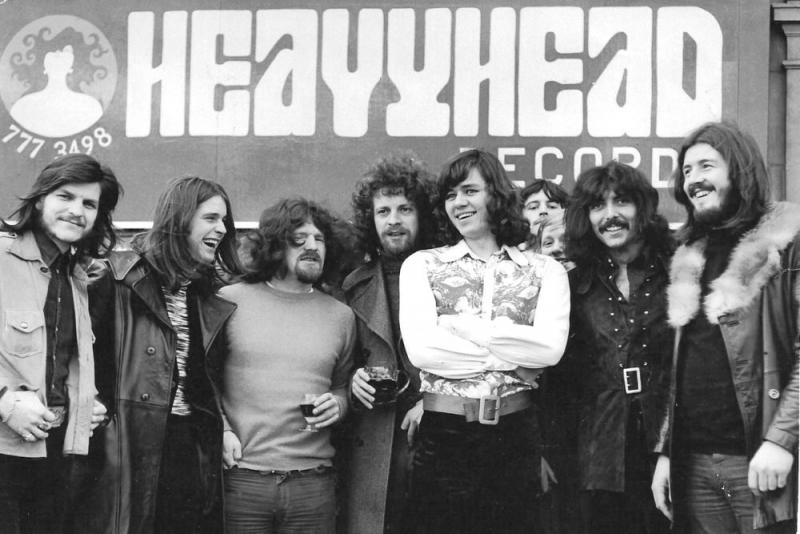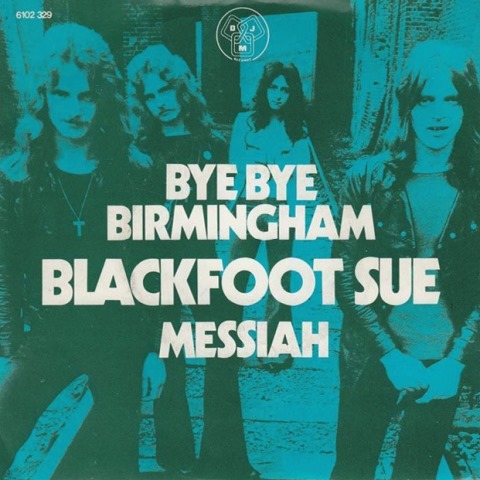Music Reissues Weekly: Once Upon A Time In The West Midlands - The Bostin’ Sounds of Brumrock 1966-1974 | reviews, news & interviews
Music Reissues Weekly: Once Upon A Time In The West Midlands - The Bostin’ Sounds of Brumrock 1966-1974
Music Reissues Weekly: Once Upon A Time In The West Midlands - The Bostin’ Sounds of Brumrock 1966-1974
Birmingham in a box

The picture seen above doesn’t have quite the same resonance as Art Kane’s 1958 shot A Great Day in Harlem which brought 57 American jazz musicians in front of his lens, but it is nonetheless significant. Here, in 1971, is an evocative, unique record of a moment in West Midlands music history.
In the front, from left to right, are Rick Price, Ozzy Osbourne, Raymond Froggatt, Jeff Lynne, Bev Bevan, Tony Iommi and John Bonham. In one place at one time were then or past members of Black Sabbath, The Electric Light Orchestra, The Idle Race, Led Zeppelin, The Move and more. Bevan worked behind the counter in the shop when he could. Roy Wood helped out on odd Saturdays, in full make-up. John Bonham hung out there, as did Jasper Carrott. Popping in to snap up a copy of Exile On Main Street or Ten Years After’s Watt, there was fair chance you’d hand your money to Bevan – or his mother. Later, in 1976, the flip side of Bevan’s solo single “Let There be Drums” was titled ”Heavy Head.”
 What’s caught by this thrilling photo is an informal confirmation that Birmingham and its immediate surroundings was a significant player in pop music. It’s reproduced in the booklet accompanying Once Upon A Time In The West Midlands – The Bostin’ Sounds of Brumrock 1966–1974, a 69-track, three-CD clamshell set cleaving to its title. The tracks are not all Birmingham born. Wolverhampton is in there too.
What’s caught by this thrilling photo is an informal confirmation that Birmingham and its immediate surroundings was a significant player in pop music. It’s reproduced in the booklet accompanying Once Upon A Time In The West Midlands – The Bostin’ Sounds of Brumrock 1966–1974, a 69-track, three-CD clamshell set cleaving to its title. The tracks are not all Birmingham born. Wolverhampton is in there too.
In the immediate post-Beatle era, Jimmy Powell & The Dimensions became the first Birmingham group to record. The first regional outfit into the Top Ten were The Applejacks with “Tell me When,” a March 1964 chart entry. Once Liverpool was on the musical map, record labels looked to Birmingham as a potentially similar wellspring: two LPs titled Brum Beat arrived in 1964, one on the London budget label Dial the other on the more storied Decca. Soon, The Fortunes, The Moody Blues, The Rockin’ Berries and The Spencer Davis Group followed The Applejacks into the charts. The no-less important Gerry Levene and the Avengers, Mike Sheridan and the Nightriders, The Ugly’s and more did not. But as it opens in 1966, this lift-off is not where Once Upon A Time In The West Midlands begins.
Once Upon A Time In The West Midlands is sequenced chronologically, though for listening flow it’s not strictly diaristic. Disc One covers 1966 to 1969, Disc Two 1968 to 1970 and Disc Three 1970 to 1974. No reason is given for choosing 1966 as the start date – the seeds sewn and successes of earlier are missed. The opening track is The Craig’s 1966 freakbeat monster “I Must be Mad.” Counter-intuitively, cover stars The Move – formed in 1966 and instantly prominent – are first heard as Track Nine of Disc One with “I Can Hear the Grass Grow.” Some things are unlicensable so not here: Black Sabbath, the pre-Zep Robert Plant, Zeppelin themselves. It’s also not clear why 1974 is the cut-off. The local independent label Big Bear began issuing records by Birmingham bands in 1975 (it was previously dedicated to US blues) so an immediately pre-punk end date may have been more fathomable.
As the introductory essay and track-by-track commentary makes clear, it seems almost every band had members who had been in one or more of the others. That’s an exaggeration, but a local interconnectedness (i.e. what’s seen in the header photo) and a related support network were integral to what was going on.
 While The Idle Race, Medicine Head, The Moody Blues, The Move, The ‘N Betweens, The Rockin' Berries, Slade, Spencer Davis Group, Traffic, The Ugly’s and many others (The Montanas, World Of Oz amongst them) are great, it’s the lesser known territory of Disc Three which is most interesting. Blackfoot Sue (with the wonderful, glammy “Bye Bye Birmingham”), The Electric Light Orchestra, Steve Gibbons, Sheridan & Price, Slade, Wizzard and Roy Wood are present. So are lesser lights Luv Machine, Mail, Ptolomy Psycon and Salamander. The early Judas Priest are represented by the fantastic 1974 single “Rocka Rolla”, a slightly prog-leaning rocker with a creepy feel.
While The Idle Race, Medicine Head, The Moody Blues, The Move, The ‘N Betweens, The Rockin' Berries, Slade, Spencer Davis Group, Traffic, The Ugly’s and many others (The Montanas, World Of Oz amongst them) are great, it’s the lesser known territory of Disc Three which is most interesting. Blackfoot Sue (with the wonderful, glammy “Bye Bye Birmingham”), The Electric Light Orchestra, Steve Gibbons, Sheridan & Price, Slade, Wizzard and Roy Wood are present. So are lesser lights Luv Machine, Mail, Ptolomy Psycon and Salamander. The early Judas Priest are represented by the fantastic 1974 single “Rocka Rolla”, a slightly prog-leaning rocker with a creepy feel.
This disc cuts to the chase of what inevitably comes to mind while listening to the set’s later cuts. Despite the absence of Black Sabbath, can the roots of the West Midlands metal scene – encompassing Magnum, eventually birthing Napalm Death – be heard? Not really. Dave Morgan’s “Ill Wind” (1971) is freaky, Luv Machine’s “Reminiscing” is a fine riff-rock pop number, Jimmy Powell’s “Talking Progressive Blues” (1971) chugs along and Possessed’s “Disheartened and Disillusioned “ fuses hard rock with prog (1971). Only Bedlam’s Cozy Powell-driven “The Beast” (1973 – heard here in a new remix) suggests an impending dawn of heaviness.
Once Upon A Time In The West Midlands - The Bostin’ Sounds of Brumrock 1966-1974 is about the moments it captures and the paths of their creators. And despite the geographic specificity of what’s collected, it's hard to point to anything heard as intrinsically "Birmingham" though. While everything collected is great, a sense of regional evolution and concomitant reaction remains out of reach. Another release will have to describe these pop-cultural arcs.
- Next week: Contrasting ways of revisiting the past with The Pretty Things Live At The BBC and The Dave Clark Five's first US album
- More reissue reviews on theartsdesk
- Kieron Tyler’s website
Share this article
The future of Arts Journalism
You can stop theartsdesk.com closing!
We urgently need financing to survive. Our fundraising drive has thus far raised £49,000 but we need to reach £100,000 or we will be forced to close. Please contribute here: https://gofund.me/c3f6033d
And if you can forward this information to anyone who might assist, we’d be grateful.

Subscribe to theartsdesk.com
Thank you for continuing to read our work on theartsdesk.com. For unlimited access to every article in its entirety, including our archive of more than 15,000 pieces, we're asking for £5 per month or £40 per year. We feel it's a very good deal, and hope you do too.
To take a subscription now simply click here.
And if you're looking for that extra gift for a friend or family member, why not treat them to a theartsdesk.com gift subscription?
more New music
 Waylon Jenning’s 'Songbird' raises this country great from the grave
The first of a trove of posthumous recordings from the 1970s and early 1980s
Waylon Jenning’s 'Songbird' raises this country great from the grave
The first of a trove of posthumous recordings from the 1970s and early 1980s
 Lady Gaga, The Mayhem Ball, O2 review - epic, eye-boggling and full of spirit
One of the year's most anticipated tours lives up to the hype
Lady Gaga, The Mayhem Ball, O2 review - epic, eye-boggling and full of spirit
One of the year's most anticipated tours lives up to the hype
 Slovenian avant-folk outfit Širom’s 'In the Wind of Night, Hard-Fallen Incantations Whisper' opens the door to inner space
Unconventional folk-based music which sounds like nothing else
Slovenian avant-folk outfit Širom’s 'In the Wind of Night, Hard-Fallen Incantations Whisper' opens the door to inner space
Unconventional folk-based music which sounds like nothing else
 'The Art of Loving': Olivia Dean's vulnerable and intimate second album
Neo soul Londoner's new release outgrows her debut
'The Art of Loving': Olivia Dean's vulnerable and intimate second album
Neo soul Londoner's new release outgrows her debut
 Music Reissues Weekly: The Peanut Butter Conspiracy - The Most Up Till Now
Definitive box-set celebration of the Sixties California hippie-pop band
Music Reissues Weekly: The Peanut Butter Conspiracy - The Most Up Till Now
Definitive box-set celebration of the Sixties California hippie-pop band
 Doja Cat's 'Vie' starts well but soon tails off
While it contains a few goodies, much of the US star's latest album lacks oomph
Doja Cat's 'Vie' starts well but soon tails off
While it contains a few goodies, much of the US star's latest album lacks oomph
 Mariah Carey is still 'Here for It All' after an eight-year break
Schmaltz aplenty but also stunning musicianship from the enduring diva
Mariah Carey is still 'Here for It All' after an eight-year break
Schmaltz aplenty but also stunning musicianship from the enduring diva
 Album: Solar Eyes - Live Freaky! Die Freaky!
Psychedelic indie dance music with a twinkle in its eye
Album: Solar Eyes - Live Freaky! Die Freaky!
Psychedelic indie dance music with a twinkle in its eye
 Album: Night Tapes - portals//polarities
Estonian-voiced, London-based electro-popsters' debut album marks them as one to watch for
Album: Night Tapes - portals//polarities
Estonian-voiced, London-based electro-popsters' debut album marks them as one to watch for
 Album: Mulatu Astatke - Mulatu Plays Mulatu
An album full of life, coinciding with a 'farewell tour'
Album: Mulatu Astatke - Mulatu Plays Mulatu
An album full of life, coinciding with a 'farewell tour'
 Music Reissues Weekly: Sly and the Family Stone - The First Family: Live At Winchester Cathedral 1967
Must-have, first-ever release of the earliest document of the legendary soul outfit
Music Reissues Weekly: Sly and the Family Stone - The First Family: Live At Winchester Cathedral 1967
Must-have, first-ever release of the earliest document of the legendary soul outfit

Add comment